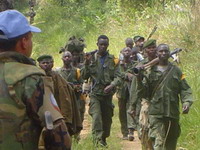Eastern Congo remains for 2nd day battlefield of rebel fighters and army troops
Eastern Congo civilians had to flee while rebel fighters exchanged fire for a second day Thursday with army troops.

Insurgents dug into hilltop positions near the village of Rugari fired at vehicles passing on a road below that runs north from the provincial capital, Goma, to Rutshuru with small arms and heavy machine-guns, said Indian Maj. Prem Kumar Tiwari, a spokesman for the U.N. peacekeeping force.
Army units deployed in the region repelled the attack,
A team of aid workers from the International Rescue Committee stopped on the road after hearing government shelling boom through the surrounding hills, said Bob Kitchen, IRC's emergency response team coordinator.
Kitchen said the team was "waiting for the fighting to pass, but they had to turn back to Rutshuru," a nearby town further north that was attacked by former Gen. Laurent Nkunda's fighters a day earlier, forcing most of its inhabitants to flee.
Kitchen said the IRC team saw "hundreds, maybe thousands" of people fleeing down the road. "This environment of war has got people extremely sensitive to the sound of fighting. There's a lot of displacement," Kitchen said, adding the fighting was making it increasingly difficult to reach those affected by it.
Exchanges of fire also broke out on a road east of Rutshuru on Thursday, Kitchen said. Though most Rutshuru residents fled the town after it was attacked, most had returned by Friday, Tiwari said.
IRC runs health and water programs in several villages in the region.
Clashes between Nkunda's men and government loyalists erupted in August and has battered the countless verdant hills of North Kivu province, forcing more than 176,000 people to flee, according to U.N. figures. The region has been insecure for years, and the latest violence has pushed the total number of displaced in the province to around 800,000.
On Wednesday, Nkunda fighters attacked an army battalion headquarters in Rutshuru, Tiwari said. Fighting lasted about an hour, and armored U.N. peacekeeping vehicles were deployed to protect a nearby displaced camp. Helicopter gunships flew over rebel positions in a "show of force" that helped end the attack, Tiwari said, adding that peacekeepers did not open fire.
Nkunda defected from the army several years ago and formed his own militia soon after Congo's war ended in 2002, claiming he needed to protect his minority Tutsi ethnic group from Rwandan rebels who have occupied forests in east Congo since fleeing Rwanda's 1994 genocide, which their leaders helped organize. More than 500,000 ethnic Tutsis and moderate Hutus were killed during the Rwandan slaughter 13 years ago.
The 18,000-strong U.N. force in Congo is the largest the largest U.N. peacekeeping mission in the world. Though violence has persisted in east Congo, the force has helped maintain security in the vast mineral-rich country since the end of a 1998-2002 war that drew in the armies of more than half a dozen African nations.
Congo's government has struggled with little success to establish authority over the lawless eastern regions of the country, thousands of kilometers (miles) from the capital, Kinshasa.
Subscribe to Pravda.Ru Telegram channel, Facebook, RSS!


